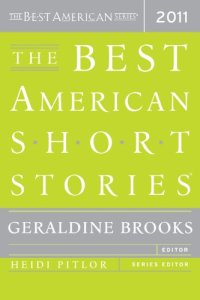The Best American Short Stories 2011 by Geraldine Brooks, ed.
 Monday, October 3, 2011 at 10:00PM
Monday, October 3, 2011 at 10:00PM 
Published by Mariner Books on October 4, 2011
Any "best of" collection will succeed or fail -- in the reader's judgment -- according to how closely the editor's taste aligns with the reader's. Of the twenty stories in this volume, I think about half undeniably merited inclusion, and the other half aren't bad (although I suspect I might have chosen a different ten to replace them if given the daunting task of wading through hundreds of stories in search of gems). While the editors and I have somewhat different opinions as to what constitutes an outstanding short story, our differences are not vast. I particularly appreciated the diversity of the stories they chose and their recognition that the inclusion of a plot does not destroy the integrity of character-driven fiction.
I admired "Foster" -- the story of an Irish girl who leaves behind "shame and secrets" when she goes to live with another family for a time -- for Claire Egan's ability to describe characters and settings with high definition clarity. Both touching and heartening, it is my favorite of the twenty.
Some of the best stories in the collection are perceptive studies of characters responding to adversity: Tom Bissell's "A Bridge Under Water" examines the lives of a newly married couple who are only starting to understand their differences during the first days of an ill-fated honeymoon in Rome. In Ehud Havazelet's "Gurov in Manhattan," a Russian immigrant, reflecting upon a two year battle with cancer followed by his girlfriend's decision to leave him (and whose dying dog is now in his care), compares his life to the characters created by Russian literary masters. The death of small town America is the subject of Caitlin Horrocks' sadly funny "The Sleep." In "ID," the prolific Joyce Carol Oates puts us inside the head of a teenage girl who is asked to identify the body of a woman who might be her mother.
The stories I most enjoyed reading were funny, although the humor tended to be low-key: "The Dungeon Master," Sam Lypsyte's offbeat, engaging look at alienated teenagers, and "Phantoms," in which Stephen Millhauser describes and attempts to explain the phantoms that inhabit his town (and yours), both made me smile, but "Escape From Spiderhead," George Saunders' futuristic assault on chemically enhanced language and love, provoked serious laughter.
Some stories are good but fall short of reaching their potential for greatness: In "Dog Bites," Ricardo Nuila explores the relationship between an accomplished father and a son with an undefined mental illness. "Soldier of Fortune" by Bret Anthony Johnston tells of a high school boy's fascination with the girl next door and his eventual discovery of the secret she keeps.
Some of the stories are well written but not particularly interesting: In "Ceiling" by Chimamanda Ngozi Adichie, a Nigerian contemplates his success and considers the possibility of change, knowing he lacks the courage to confront his insensitive wife, his superficial associates, or his corrupt benefactor, while indulging the fantasy of reconnecting with a former lover who has rejected him. "The Call of Blood" by Jess Row is an overly ambitious examination of history, ethnicity, and the burdens carried by a medic-turned-nurse who is caring for a dying patient. Megan Mayhew Bergman's "Housewifely Arts" is the story of a woman who makes a nine hour drive to Myrtle Beach with her seven-year-old son so she can hear a parrot speak in the voice of her dead mother -- a journey designed to help her face her guilt. Rebecca Makkai writes about an actor who loses both his ability to act and his relationship with a friend in "Peter Torrelli, Falling Apart."
Allegra Goodman aims for poignancy in "La Vita Nuova," her story of a woman who, having been dumped by her fiancé shortly before her wedding date, babysits for a young boy and paints the histories of the people she knows (and her own) on Russian nesting dolls. I was unmoved. I had a similar reaction to "Property," an assemblage of clever sentences by Elizabeth McCracken that describe a man's life in the months following his wife's death, and to "The Hare's Mask," Mark Slouka's tale of a boy's attachment to rabbits during a dark and frightening time.
Strangely enough, two stories are written in the second person, a technique that rarely works. For all her talent, Jennifer Egan ("Out of Body") doesn't pull it off. The underrated Richard Powers ("To the Measures Fall") is more successful in his homage to literature and a lifetime of reading.
Nathan Englander's "Free Fruit for Young Widows" attempts to explain, and perhaps to justify, wanton acts of multiple homicide by making a case for the philosophy of proactive self-defense, but the storytelling is too heavy-handed and the circumstances too contrived for the attempt to succeed. Fortunately, it's the only story in the collection I considered a clunker.
RECOMMENDED
Reader Comments